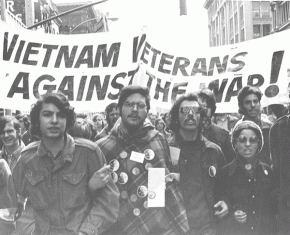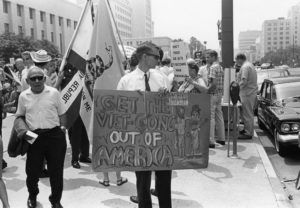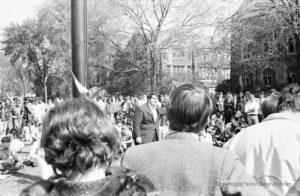What does it mean to be a “true patriot”? In liberal democracies, this question is a subject of continual contestation because people have different ideas about both the rights and the obligations of being citizens. In turbulent times in particular, conflicting ideas  about the meaning of patriotism are brought to the fore and sometimes even lead to violence.
about the meaning of patriotism are brought to the fore and sometimes even lead to violence.
One of the primary themes in “The War at Home” is about what it means to be a true patriot. The film is implicitly about the contest between two images of patriotism that have been exposed by the “ruptured equilibrium” of the Vietnam War. Although it tilts in favor of the student demonstrators, there are a number of instances in which the opponents of the protests are given the opportunity to express contrary views about the meaning of patriotism.
Assignment
Write a three-page (no more!), typed, double-spaced, 12-point font essay in which you use the events, issues, and people in “The War at Home” to identify both sides of the debate over the meaning of true patriotism. Then, defend one side against the other. You must choose one side. No waffling, fence-sitting, or tightrope-walking!
To make your case, choose two people from the film who will allow you to make the strongest case for both sides. Do not choose a weak example and then simply argue against it; if you do so, your argument will not be persuasive at all and your reader will likely vote against you. There is a strong case to be made for both understandings of patriotism.
This assignment challenges you to make a persuasive argument. Your essay should address and take a stand on all of the above issues. This means: 1) stating the issue (i.e., the connection between liberal democracy and conflicting interpretations of patriotism); 2) identifying both sides of the argument over “true patriotism”; and 3) clearly stating which side you take and why you are right and the other side is wrong. Your Intro paragraph should address all of the issues in the first two paragraphs at the top of this page. Every word counts!
To identify your actors, you should refer to the time or times (e.g., 0:35, 0:49) at which they show up in the film. Then, give them names (e.g., “Taylor” and “Justin,” “John” and “Paul”). If you quote someone directly, include the time stamp.
This assignment is designed to help you learn by doing. The method behind my methodological madness is to help each of you develop the skills for making strong and persuasive arguments. Your ability to make persuasive arguments will serve you well throughout your years at Notre Dame and, frankly, for the rest of your professional and personal life.
My motto for persuasive writing comes from a Shaker hymn: ‘Tis a joy to be simple. It is much easier to write a long, meandering essay than one that presents a simple and straightforward argument. And simple does not mean simplistic.
This assignment may seem fairly easy because the essay is only three pages. In fact, it is quite demanding. I strongly advise you to get going right away. Print and read these instructions carefully. Underline key words and requirements. Then, write a first paragraph. Put it aside and then when you return write an entire draft of the essay. Repeat until you are fully satisfied.
We will evaluate your essay according to three criteria: the clarity and consistency of your argument; your use of readings, lectures, discussion sections, and the film to back up your points concretely; and, importantly, your demonstrated ability to think for yourself. Remember: if you are not sure what you are saying, we will not be sure what you are saying either. When referring to your readings, use a short and simple citation form (e.g., author and page). It’s fine to use short quotations, but indicate why you are using them. Quotations do not speak for themselves. Finally, feel free to use your imagination to capture what your two personalities would likely say if given the chance to engage in an extended argument. Will they like each other? Almost assuredly not.

Fr. Hesburgh recollects: “It seemed that the predominant sentiment on campus switched over from violence to nonviolence in that one single week. . . . It was great good luck, the grace of God, and the very special love, respect, and caring that our people have always had for one another at this very special place called Notre Dame.”
Remember: It is illogical not to visit the Writing Center. It is always helpful to have another set of eyes read what you have written. Otherwise, your essay must be completely your own work. The Honor Code, to which you have affixed your signature applies. Please do not discuss your essay with anyone. Do not use Chat GPT or any other form of AI. If you do, we will know.
If you send me your first paragraph by Monday, September 25, I will be glad to comment on it. Your TAs will be equally happy to comment on your Intro paragraphs. It goes without saying, but I will say it anyway, you should also visit us during office hours.
My expectations are not unreasonable. I merely expect you to write the best, most persuasive essay you have ever written.
Your essay is due by 8:00 pm next Wednesday, September 27. Since you have a week to write your essay, we will frown on granting extensions. Your TA will tell you how to turn it in.
Good luck!
AJM
